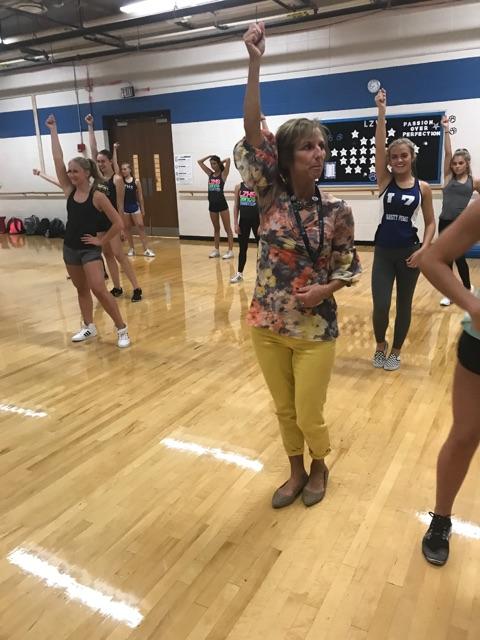Above Par: Coaches take on job of teaching and coaching
Photo by photo used with permission of Sophie Young
Teri Johlie, poms coach, instructs her team on the next routine at practice.
His morning begins at 4 AM. After a dark commute, arrive at school at 6 AM. Teach dozens of students until 3 PM. Coach a number of athletes until 6 PM. Following another long trip, arrive home at 7 PM. The next day, repeat the process again. This is one of the daily schedule for teachers who also take on the task of coaching.
Terry Geoghegan, government teacher and varsity boys’ golf coach, handles the large workload by keeping his teaching and coaching careers separate to prevent distractions.
“I keep [coaching and teaching] separate. I don’t think about my golf season during school. I let [those thoughts] occur after school, and I stress about my golf season, scheduling, stuff like that prior to the season,” Geoghegan said.
In addition to keeping a balance between coaching and teaching, Geoghegan says spending quality time with family is a challenge to fit in on busy days.
“Honestly, it seems as if family comes last during golf season,” Geoghegan said. “It is teacher first, and I’m always going to be a father first, but I think that my family knows I’m not home that much. My approval rating goes way up when preparing for golf season because ‘dad’, in theory, is a good person, but it is a tough juggle. It’s just not sports for coaches, it’s also the band, the plays, sponsors… they all juggle in the same way that coaches do, and sometimes people forget that. I know it’s hard, and I’m lucky that my kids are older and they’re understanding of this juggling.”
On the contrary, Geoghegan has encountered situations in the past where he has to put his family before coaching and teaching.
“At my old school I was coaching football, but when [my wife and I] had our second child, she made me quit. Understandably, because, with two small kids, it was getting tiresome during a long football season. You have to adapt. I’m a fan of just sucking it up. There’s no use in complaining. I signed up for this,” Geoghegan said.
Alike to Geoghegan, Teri Johlie, English teacher and poms coach, says that important family events have “forced” her out of coaching and teaching for periods of time. She also agrees that tough workloads at school have complicated the balance.
“The only thing that really becomes a challenge is dealing with family illnesses. [They] have taken me out of state in order to take care of my parents or my own personal family,” Johlie said. “Overall, it’s just certain times of the year when the load with school, working, grading, and meetings make it tough, occasionally, to keep a balance, but it doesn’t happen too often.”
Spending time at home is one priority Johlie has, and says that eating dinner and spending time with her family are important aspects of any day.
“I think that my family is my main priority,” Johlie said. “I think it’s important for parents to be home, if possible, as much as they can. However, I started coaching when my kids were doing activities after school as well. In fact, some of my kids were nearing the end of high school and going on, so I had a lot less at home to deal with. But, the priority still being able to be home and being a part of my family in the evening and for dinner.”
In addition to spending time with family, Johlie says that her nights at home are focused on finishing school-related work.
“I never go home after coaching and am done with school stuff. There is always something I need to be working or focusing on: something such as lessons for the next day or grading or following up with emails to parents. With any teacher, you don’t typically leave it all at school and go home. It’s a job you take home with you and still have work to do,” Johlie said.
One student that Johlie coaches and teaches in the same time period this year is Chayse Spies, junior, who mentions that stress occasionally reaches Johlie when handling everything.
“Mrs. Johlie gets overwhelmed sometimes, especially during competition season,” Spies said. “However, she’s always managed to get us to listen to her and pay attention, which is helpful since we are stressed out as well.”
Even when the stress of the daily routine may seem too tough to handle, the payoff is worthwhile.
“Coaching is a commitment, but if you enjoy it, it is definitely worth it,” Johlie said. “While it is time-consuming, it’s a good type of commitment if you are enjoying it, since that’s what it’s all about. If I’m not having fun, I’m not going to continue to do it.”

As a sophomore, this is Adam's first year on staff for the Bear Facts Student Media Program. In addition to Bear Facts, Adam is also involved in the...

